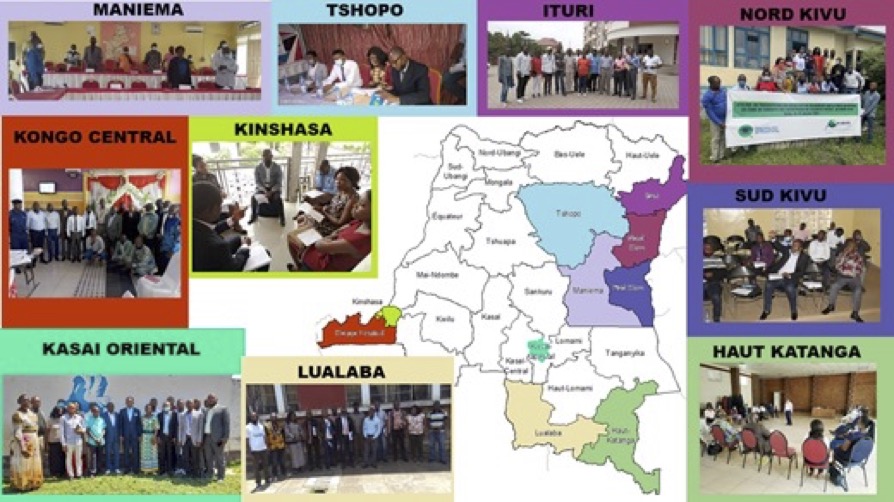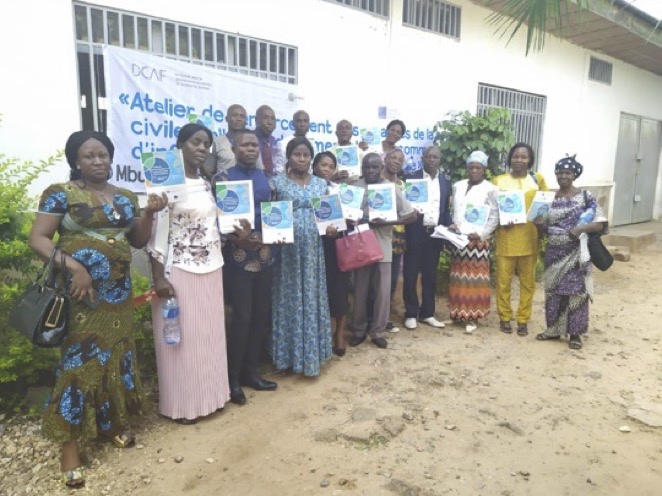LAUNCH OF PRACTICAL GUIDE FOR CIVIL SOCIETY ON PRIVATE SECURITY
A Practical Guide to Private Security for Civil Society Organisations
What is private security? What does the International Code of Conduct cover? And what roles can civil society organisations play to promote responsible private security? Three partners, DCAF – the Geneva Centre for Security Sector Governance, the Observatoire d’Etudes et d’Appui à la Responsabilité Social et Environnementale (OEARSE) and the International Code of Conduct Association (ICoCA) have been working hard during the past 15 months to address these questions received from civil society organisations (CSOs).
Thanks to the generous support of the UK Government and the Swiss Federal Department of Foreign Affairs Peace and Human Rights Division, project partners developed a practical guide for civil society on collecting, documenting and reporting on private security and adapted it to the Democratic Republic of Congo (DRC) context. The tool provides an overview of international norms and standards applying to private security and includes good practices and additional elements to consider when integrating a private security focus in larger human rights promotion and protection work.
The framework of the practical guide is available in English here.
The practical guide contextualised to DRC is available in French here.
Engaging Civil Society Organisations in the Democratic Republic of Congo (DRC)
13 CSOs based in 10 different provinces in DRC (South Kivu, North Kivu, Tshopo, Kasaï Oriental, Kongo Central, Lualaba, Maniema, Ituri, Haut Katanga, Kinshasa) supported the contextualisation of this practical guide by compiling information on the private security industry in their respective provinces and validating their findings during multi-stakeholder workshops.

With the support of selected CSOs over 75 civil society organisations and 10 representatives of local regulatory authorities based in five provinces (North Kivu, Ituri, Lualaba, Kinshasa, Kasaï Oriental) were introduced to the practical guide and provided feedback. Participation of the regulator was welcomed given the state’s reliance on CSO support to exercise effective oversight of private security. The tool was further tested by three monitoring expert organisations
“The practical guide is a tool of primary necessity for the promotion of private security governance, a useful tool not only for civil society but also for private security companies and their guards as well as for clients. Hence there’s an urgent need to disseminate it.”
Challenges with private security industry in DRC
During these exchanges, CSOs highlighted a range of challenges with regard to the private security industry operating in DRC:
- Dire working conditions: Private security guards provide security services under dire working conditions which often doesn’t seem to be of any to concern to the client, nor the private security company itself.
- Poor selection and vetting: Recruitment processes do not ensure effective vetting of candidates, often resulting in the hiring of guards which formed part of public security, a militia or rebellion in the past 5 years.
- Lack of information: Obtaining information about the private security industry and monitoring it effectively is a challenge for CSOs as the industry is often marked by its secretive nature and CSOs are not familiar with the sector.
- Clients: Clients of private security companies do not always carry out the necessary due diligence when contracting private security providers. This leads to instances where they work with poorly trained providers, sometimes acting inappropriately, providers operating illegally in the country or with some owned by militias.
“We don’t understand how some International Organisations can use a PSC that is not recognised at the provincial level even though it is authorised at the national level.”
- Poor training: Private security guards are not well trained and training on human rights is often missing.
- No respect of international standards and national law: Standards of the International Code of Conduct such as the prohibition of Torture or Other Cruel, Inhuman or degrading Treatment or Punishment,apprehension of individuals, zero tolerance of corruption, use of force and prevention of sexual exploitation and abuse are not respected.
- The mix of public and private security: Public and private security operating in tandem makes it challenging to ensure accountability of human rights abuses effectively.
- Ownership: In many cases private security companies are owned by the political elite, military actors or militias.
“In the context of the DRC the tool needs to look at the actual ownership of the Private Security Company. Because in many cases the Private Security Companies belong to the political and military elite that are sometimes involved in many human rights violations.”
Recommendations of CSOs
To start addressing these challenges, CSOs recommended that:
- A multi-stakeholder group exchanging regularly on issues of private security be created.
- Private security guards be identified and registered systematically.
- Regulation of the private security industry and labour law in DRC be strengthened.
- Private security guards be systematically trained based on international standards and national law.
- They build their capacity on private security and relevant international standards and national law.
“Hence [referring to incidents of inhuman treatment] the importance of raising awareness about respect for human values in the workplace.”
Call for Support
With the launch of this practical guide, project partners hope that an important step towards implementing these recommendations has been taken and that efforts will be able to continue. As financing for this project ended in March 2021, project partners call for continued donor support to ensure sustainability of these efforts and increasing dynamic in DRC.
These are intended as living documents and will be updated as the practical guide is rolled out further. Project partners welcome all feedback.

CSO workshop introducing the tool in Kasaï Oriental, DRC
4 March, 2021
